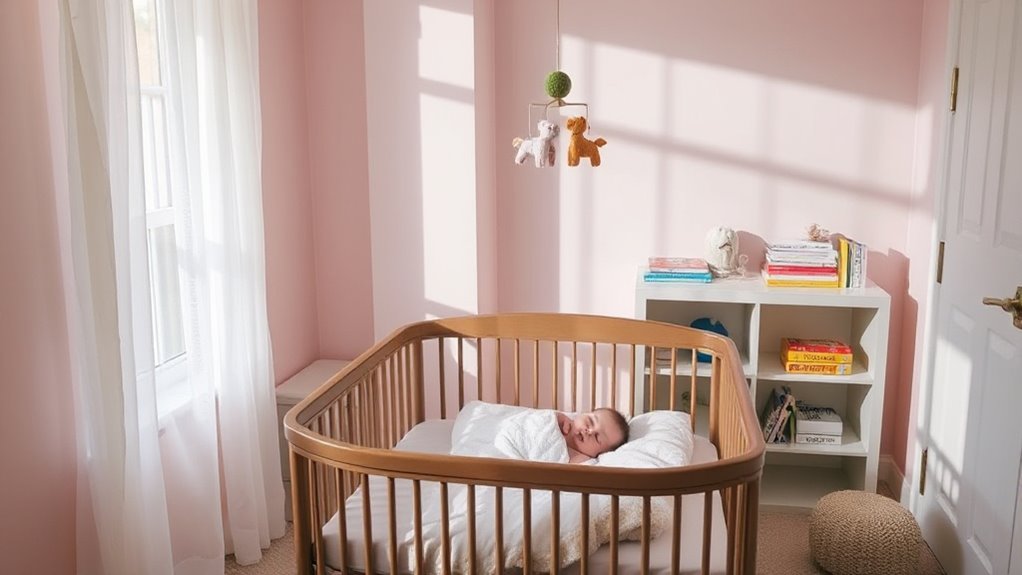Understanding your baby’s sleep cycles is key to nurturing their development. Babies typically sleep 14-18 hours a day, waking frequently due to short sleep cycles of about 40-60 minutes. They spend about half their sleep in REM, which is essential for growth. As your baby ages, sleep patterns change, influencing their nighttime rest. Establishing a consistent routine can help improve their sleep quality. Discover how to tailor this routine to your baby’s needs for even better outcomes.
Key Takeaways
- Babies have shorter sleep cycles of 40-60 minutes, leading to frequent awakenings compared to adults’ 90-minute cycles.
- Newborns require 14-17 hours of sleep daily, with about 50% spent in REM sleep for growth and brain development.
- Sleep architecture evolves as babies grow, transitioning from frequent short naps to longer sleep periods and fewer daytime naps.
- Establishing a consistent bedtime routine helps regulate sleep patterns and promotes better sleep quality for infants.
- Daytime naps are crucial for improving nighttime sleep quality, as they help regulate overall sleep cycles in babies.
Importance of Sleep for Babies

Sleep is essential for your baby’s growth and development. Adequate sleep supports health, attention span, mood, language skills, and motor development. Research indicates that emotional support during sleep transitions can enhance a baby’s overall well-being. Additionally, establishing a consistent sleep routine can help your baby feel secure and promote better sleep.
Newborns typically need 14-17 hours of sleep every 24 hours, with their sleep patterns evolving as they grow. In the early months, babies spend about 50% of their sleep in REM sleep, which is vital for cognitive development.
By understanding Baby Sleep Cycles, you can help establish healthy sleep habits that lead to improved immune function and cognitive performance later in life. Additionally, recognizing critical periods in your baby’s development can help optimize their sleep environment and routines.
Differences in Sleep Patterns Between Infants and Adults

Understanding how sleep patterns differ between infants and adults can help you navigate your baby’s nighttime routine more effectively.
Infants need up to 18 hours of sleep daily, compared to at least 7 hours required by adults. Baby sleep patterns include shorter sleep cycles of around 40 minutes, while adults experience longer cycles of about 90 minutes. High refresh rates enhance the clarity of sleep-related visual stimuli, aiding in creating a calming environment.
Infants require up to 18 hours of sleep daily, with shorter cycles of about 40 minutes, unlike adults’ 90-minute cycles.
Newborns often wake every 3 hours due to underdeveloped circadian rhythms, unlike adults who enjoy consolidated sleep periods. Additionally, infants spend about 50% of their total sleep time in REM sleep, vital for brain development, whereas adults only spend around 20%.
As your baby matures, their sleep patterns will gradually resemble those of adults, with longer nighttime sleep and fewer daytime naps. Furthermore, establishing a consistent bedtime routine can promote healthy sleep habits and ease the transition to longer sleep periods.
Understanding Baby Sleep Cycles

While steering through your baby’s sleep, it’s essential to grasp how their unique sleep cycles work.
Babies have shorter sleep cycles than adults, lasting around 40-60 minutes, which means they wake frequently, especially for feedings. Their sleep consists of two main types: REM sleep, where active movements and noises occur, and non-REM sleep, which involves deeper, quieter rest. Understanding the importance of sleep architecture can help caregivers support better sleep patterns in infants. Newborns typically sleep 14-17 hours a day, providing ample time for growth and development.
Newborns spend about 50% of their sleep in REM, critical for brain development. As they grow, their sleep architecture evolves, leading to longer cycles and more adult-like patterns. Establishing a bedtime routine can significantly enhance your baby’s sleep quality and help you recognize signs of tiredness.
Recognizing signs of tiredness can help you establish a sleep routine, promoting consistent sleep quality for both you and your baby, ensuring everyone gets the rest they need.
Normal Sleep Patterns by Age

As your baby grows, their sleep patterns will change considerably. You’ll notice varying sleep durations and developmental shifts in how they rest at different ages. For instance, understanding the normal sleep patterns of infants can help you anticipate their needs better. Understanding these normal sleep patterns can help you support your baby’s unique needs effectively. Additionally, nighttime meditation techniques can be beneficial for parents to help manage their own stress during this transition.
Sleep Duration by Age
Babies’ sleep durations vary considerably by age, reflecting their developmental needs.
Newborn babies typically sleep between 11 to 19 hours a day, waking for feedings every 2 to 3 hours.
As they grow, from 3 to 6 months of age, total sleep duration decreases to about 10 to 18 hours, with deeper sleep becoming more common.
By 6 to 12 months, babies usually sleep around 10 to 16 hours, and their sleep patterns start to resemble adult patterns.
After 12 months, infants generally sleep between 9 to 15 hours, featuring longer night sleeps and fewer daytime naps.
Developmental Sleep Changes
Understanding how your baby’s sleep changes as they grow can help you navigate their developmental journey more smoothly.
Here’s a breakdown of typical developmental sleep changes you can expect:
- Newborn Sleep: 14 to 17 hours a day, often waking for feedings.
- 3 to 6 Months: 10 to 18 hours daily, with longer deep sleep periods and more consistent daytime naps.
- 6 to 12 Months: Total sleep reduces to 10 to 16 hours, resembling adult sleep patterns with extended nighttime sleep.
- After 12 Months: 9 to 15 hours total, featuring longer nighttime sleep and fewer daytime naps.
- Individual Sleep Needs: Every baby sleeps differently, so pay attention to your child’s unique sleep cues and adjust their sleep schedule accordingly.
Birth to 3 Months Sleep Expectations

During the first three months of life, your newborn’s sleep can feel unpredictable and fragmented. Typically, newborns sleep between 14 to 17 hours over a 24-hour period, with short cycles lasting about 40 to 60 minutes.
You’ll notice they alternate between REM sleep, which takes up about 50% of their sleep, and non-REM sleep, often waking every 2 to 3 hours for feedings. As their small stomachs need regular nourishment, it’s crucial to recognize signs of tiredness, like fussiness or drowsiness. This helps you establish a better sleep routine.
3 to 6 Months Sleep Expectations

As your baby grows, you’ll notice significant changes in their sleep duration and daytime nap patterns.
From 3 to 6 months, they typically sleep around 12 to 15 hours a day, with longer nighttime stretches and fewer naps.
Understanding these shifts can help you better support your baby’s sleep needs during this stage.
Sleep Duration Changes
From the moment your baby is born, their sleep patterns evolve considerably, especially in the first six months.
You’ll notice significant sleep duration changes as your little one grows. Here’s what to expect:
- Newborns typically sleep 11 to 19 hours a day, waking frequently for feedings.
- By 3 months, expect around 10 to 18 hours total, with longer stretches of deep sleep at night.
- At 6 months, many babies average 10 to 16 hours, resembling adult sleep patterns.
- Newborns may sleep for 3 to 5 hours at a stretch by 6-8 weeks.
- As they mature, babies sleep for longer periods at night, with fewer daytime naps.
Understanding these shifts in infant sleep can help you better support your baby’s needs.
Daytime Nap Patterns
With your baby’s sleep duration evolving, understanding their daytime nap patterns becomes significant.
In the first few months, your little one typically takes several short daytime naps, gradually moving toward longer awake periods as they near 6 months. By this age, expect 2 to 3 longer naps lasting up to 2 hours each.
These daytime naps play an essential role in enhancing sleep quality at night, as good daytime sleep often leads to fewer night wakings. Establishing a consistent nap routine can help regulate their sleep cycles and improve overall sleep patterns.
Pay attention to your baby’s cues to guarantee they’re getting the rest they need for healthy development and a happier day.
6 to 12 Months Sleep Expectations

Understanding your baby’s sleep expectations from birth to 12 months can greatly ease your parenting journey. During this period, you’ll notice distinct changes in your baby’s sleep patterns and the amount of sleep they require.
Understanding your baby’s evolving sleep needs in the first year can simplify your parenting experience.
- From birth to 3 months: 14-17 hours of sleep, shorter 40-60 minute cycles.
- From 3 to 6 months: 12-15 hours, with 2-3 daytime naps and longer night sleep.
- From 6 to 12 months: 11-14 hours, with fewer naps and consistent night sleep.
- By 12 months: 10-12 hours at night, plus 1-2 daytime naps.
Expect more consistency in sleep as your baby approaches their first birthday.
Navigating these stages helps you understand your baby’s needs better, ensuring a smoother day and night routine.
After 12 Months Sleep Expectations

As your child grows past the first year, their sleep needs evolve considerably, shifting towards longer nighttime rest and fewer naps.
Typically, babies in this age range need about 9 to 15 hours of sleep per day, with most getting a solid 10 to 12 hours at night. You might notice your little one going to bed between 6 pm and 8 pm and waking up around 6 am to 8 am.
Daytime naps often reduce to one or none, lasting 1 to 2 hours. However, remember that sleep patterns can vary; some children may still wake during the night.
Establishing a consistent bedtime routine is essential to support these healthy sleep habits as your baby moves into this new phase.
Tips for Establishing a Healthy Sleep Routine

Establishing a healthy sleep routine is essential for your growing child to guarantee they get the rest they need. Here are some tips to help you create an effective bedtime routine:
Creating a consistent sleep routine is crucial for your child’s growth and well-being.
- Expose your baby to natural light during the day to regulate their circadian rhythm.
- Keep the sleep environment dim and quiet at night to promote nighttime sleep.
- Track your baby’s sleep patterns to better understand their sleep cycles.
- Encourage daytime naps of up to 2 hours for longer nighttime sleep stretches.
- Create a comfortable sleep environment with a firm mattress and appropriate room temperature.
Resources and Support for Parents

Maneuvering your baby’s sleep challenges can be overwhelming, but there are plenty of resources and support options available to help you.
For expert advice on baby sleep patterns, consider reaching out to the maternal child health nurse at Pregnancy, Birth and Baby by calling 1800 882 436.
You can access support from HealthyChildren.org and KidsHealth for extensive insights on managing newborn sleep challenges.
The Smart Sleep Coach by Pampers App offers personalized sleep plans tailored to your baby’s needs.
Additionally, Pediatric Sleep coaching services provide specialized guidance for various age groups.
Don’t underestimate the power of community support through online platforms, where you can connect with other parents facing similar sleep challenges, sharing experiences and solutions.
Frequently Asked Questions
What Is the 5-3-3 Rule for Babies?
The 5-3-3 rule for babies suggests they need a total of 11 hours of sleep during the day and night.
You should aim for 5 hours of daytime naps, ideally split into two naps lasting 1-2 hours each.
Then, plan for 3 hours of early evening sleep and another 3 hours at night.
Following this structure helps your baby develop a consistent sleep routine, promoting better sleep quality and overall well-being.
What Is the 2/3/4 Rule for Baby Sleep?
Think of your baby’s sleep like a well-tuned orchestra; each section needs to play in harmony.
The 2/3/4 rule helps you accomplish this. You’ll keep your baby awake for about 2 hours after waking in the morning, 3 hours after the afternoon nap, and 4 hours before bedtime.
This guideline guarantees your little one’s well-rested, preventing overtired meltdowns and setting the stage for peaceful nights filled with sweet dreams.
What Is the 5 10 15 Rule for Baby Sleep?
The 5-10-15 rule for baby sleep is a method that helps your little one learn to self-soothe.
You start by letting your baby cry for 5 minutes before comforting them, then increase the wait time to 10 minutes, and finally 15 minutes.
This approach encourages independence during night awakenings.
Just make sure your baby is at least 4-6 months old and has a calming bedtime routine in place before you begin.
When Will Babies Learn to Connect Sleep Cycles?
Your baby typically starts connecting sleep cycles between 3 to 6 months.
By around 6 months, you might notice them sleeping longer stretches, sometimes up to 6 hours without waking.
It’s crucial to remember that every baby is different; some may take a bit longer to achieve these longer sleep durations.
As they grow, they’ll gradually learn to self-soothe, which will help reduce those nighttime wakings and improve their overall sleep.
Conclusion
Understanding your baby’s sleep cycles can feel overwhelming, yet it’s essential for their development and your sanity. While infants drift in and out of sleep in unpredictable patterns, adults crave consistency and rest. Embracing this contrast can help you establish a nurturing bedtime routine, balancing their needs with your own. Remember, every sleepless night can lead to brighter days ahead. By prioritizing sleep, you’re fostering a healthier environment for both you and your little one.









